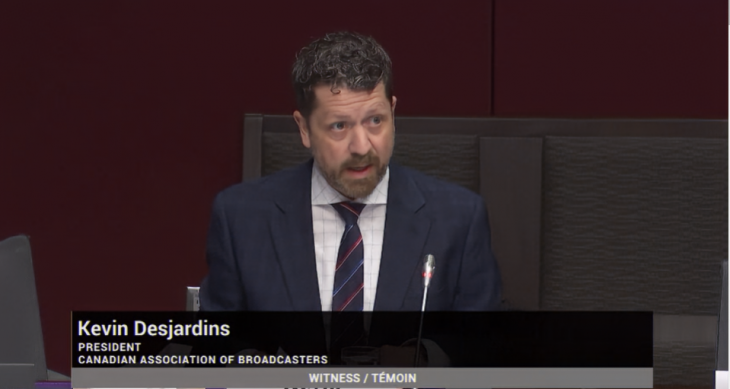
By Christopher Guly
OTTAWA – Bill C-18 is both “fair” and “necessary,” the president of the Canadian Association of Broadcasters told members of the Senate Standing Committee on Transport and Communications Wednesday evening during a hearing on the Online News Act that would require digital platforms to compensate news publishers for linking to their stories and which passed second reading in the Senate last week.
“The dominant internet platforms have told you and members of Parliament that Canada’s news is of little value or consequence to them,” said Kevin Desjardins. “They have already blocked access to content and have threatened to remove all news from their platforms if they do not get their way with this legislation.”
At the Senate committee’s hearing on C-18 last Wednesday, executives with Google and Facebook’s parent company, Meta, threatened to withdraw news articles from their platforms should the Online News Act become law.
Desjardins said that if the platforms are bringing their “our-way-or-the-highway’ approach” to this legislative process, “just imagine how they use their dominance in negotiations now when they are not even required to come to the table. They prefer the status quo of picking and choosing who[m] they wish to support and on the terms on which they do so,” he said.
“Today, if these platforms deign to even discuss any agreement with a Canadian news organization, there’s no realistic option but to agree to the platform’s terms given their dominant positions online and the lack of any fair regime for negotiation.”
Desjardins said that C-18 “strikes an important balance” by creating a framework enabling Canadian news organizations to “establish a fair value for the use of their content” and “allow for collective bargaining so that small players can jointly negotiate and help to rebalance their bargaining power with these digital behemoths.”
He added that the Online News Act provides “an arbitrated backstop should those negotiations not be constructive – and because a government agency [CRTC] is only involved as a last resort to resolve disputes when no agreement has been reached, the proposed legislation poses no threat to press freedom or free speech.”
Desjardins explained that over the past decades, foreign online platforms “have aggressively cornered the markets in search and advertising.”
“Using their dominant positions, they have dramatically impacted the advertising market through algorithmic exploitation of user data. As a result, foreign digital platforms take more than two-thirds of those ad revenues out of Canada’s economy,” he said, adding that has led to a “trade deficit in Canada’s advertising market.”
Desjardins said “these entities are exploiting Canadian news organizations’ online content to deepen their competitive advantages in advertising.”
He explained that while search and social platforms might help direct audiences to online news sites, contrary to the claims of Google and Facebook, “these are not free links.”
“In reality, Google and Facebook retain most of the value from their user interactions with news sites through their ability to gather, aggregate and resell user data to advertisers,” said Desjardins.
“Nevertheless, social and search platforms provide no compensation to news sites from the value they derive from those interactions.”
At last Wednesday’s Senate committee meeting, Rachel Curran, the Ottawa-based head of public policy in Canada for Meta, said that “it is publishers that benefit from being on our platforms, not the reverse,” noting that over the past year, Facebook feeds sent Canadian news publishers over 1.9 billion clicks worth an estimated $230 million in free marketing.
Meanwhile at this Wednesday’s hearing, Catherine Edwards, executive director of the Canadian Association for Community Television Users and Stations, asked senators to consider amending subsection 27(1)(b)(i) of C-18. It outlines the eligibility of news organizations that regularly employ “two or more journalists in Canada…who own or are a partner in the news business and journalists who do not deal at arm’s length with the business.”
Edwards would like that clause expanded to read “or is a not-for-profit broadcast undertaking that produces news.”



